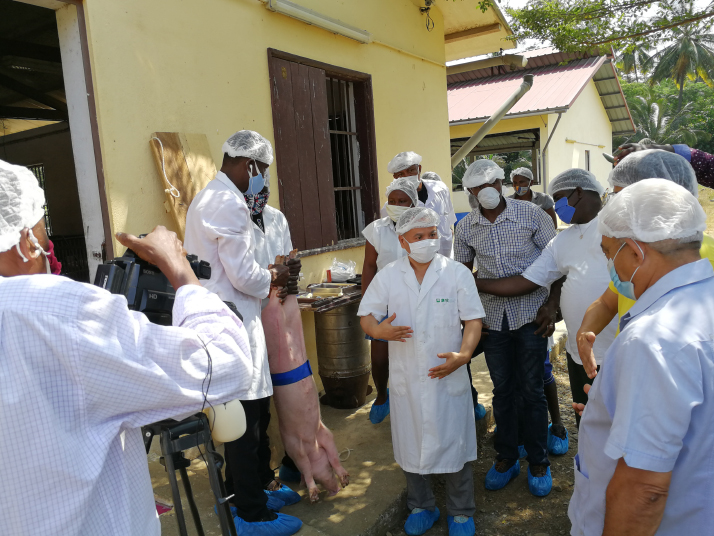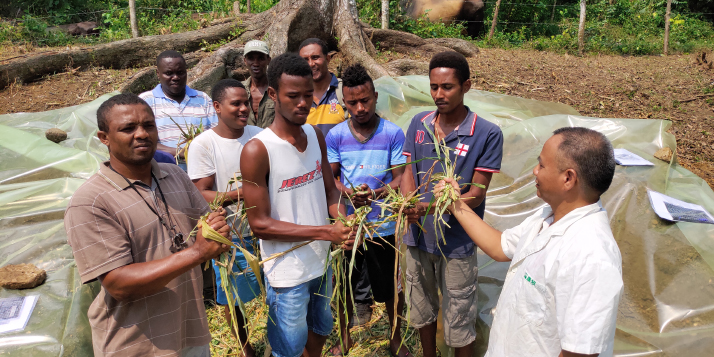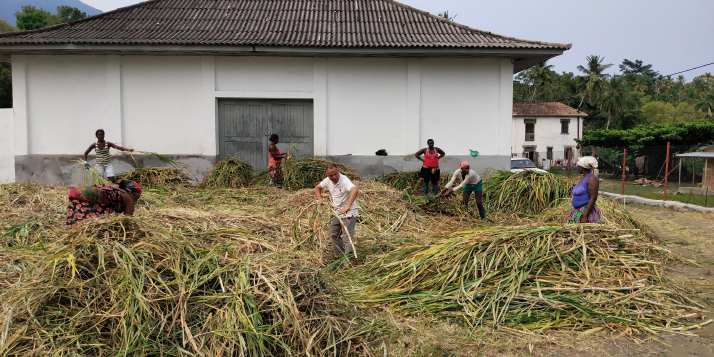|
||||||||||
| Home Nation World Business Opinion Lifestyle ChinAfrica Multimedia Columnists Documents Special Reports |
|
||||||||||
| Home Nation World Business Opinion Lifestyle ChinAfrica Multimedia Columnists Documents Special Reports |
| Agro-cooperation |
| Chinese expert helps São Tomé and Príncipe develop its animal husbandry industry |
| Wei, 51, is an expert in animal husbandry at the Agriculture and Rural Affairs Bureau of Rongxian County, Guangxi Zhuang Autonomous Region in south China. Over the past 29 years, he has been focusing on the fields of feed processing and veterinary surgery |
| By Li Kaizhi VOL.12 November, 2020 ·2020-11-12 |

No sooner had the clock struck midnight to herald the new year of 2020, a series of text messages began to show up on Wei Wangfei's phone. "Happy New Year!" "I want to make silage …" Wei knew that it was Cirilo Silva who was planning to use corn straw to produce silage. "He has obviously tasted the sweetness of it," Wei said with a smile.
Wei, 51, is an expert in animal husbandry at the Agriculture and Rural Affairs Bureau of Rongxian County, Guangxi Zhuang Autonomous Region in south China. Over the past 29 years, he has been focusing on the fields of feed processing and veterinary surgery. In April 2018, at the request of São Tomé and Príncipe, China sent a team of agricultural experts on animal husbandry, cultivation and biogas to the African country. It was China's second batch of experts to the country since the resumption of diplomatic relations at the ambassadorial level at the end of 2016. Wei was a member of the team.

"I want to teach the simplest and practical techniques of animal husbandry to the local people in order to help them increase the yield, so that they can use the limited resources to produce greater value," Wei said.
Due to the limitation of land resources, animal husbandry in São Tomé and Príncipe is still at a nascent stage, and the development is relatively slow.
"Taking pig breeding as an example, most of the sheds in rural areas still have problems such as unstandardized construction, except for a few breeding companies with relatively standardized operation. Lack of funds and technology, high cost, and low production capacity are the factors restricting the development of farmers in rural areas," Wei said. "Developing ecological breeding may be the best choice, based on the stable tropical climate and rich forage resources."
Feed processing pilot
In June 2018, Wei came to Silva's farm for the first time. It was the dry season, the grass was just beginning to wilt, and the 75 sheep and seven cattle on hand were listless. Seeing this, Wei came up with the idea using silage and ammoniation methods to turn corn stalks into feed.
After discussion with Silva, Wei, together with two other Chinese experts, decided to make a demonstration by building a 15-cubic-meter fermentation tank integrating silage, ammoniation and biological fermentation at Silva's farm, and showed the operation technology of ammoniated straw on the spot.
A month later, Silva collected his ammoniated feed. He mixed it with original feed and then fed it to his livestock. After a dry season of feeding, his cattle and sheep became fat and strong. "Chinese technology is simple and practical!" Silva said excitedly. Inspired by this, Silva subsequently built another fermentation tank to continue to expand the amount of silage and ammoniated feed. In 2019, the number of his livestock increased to 125 sheep and 10 cattle. The sheep were also sold at a better price.

The success of the demonstration also gave Diogo Vaz, a company based in Lemba County, a clear direction. In addition to its main chocolate business, the company raises 45 heads of cattle. In March 2019, they invited Wei to the company to help to build three fermentation tanks integrating silage, ammonification and biological fermentation, with a total volume of 50 cubic meters. "
In November of the same year, Natalina Vera Cruz, Director of the Animal Husbandry Bureau of the Ministry of Agriculture of São Tomé and Príncipe, visited the Demonstration and Training Base of Livestock and Veterinary Technology of China - STP. "The feed you make is very good, and the farmers are very appreciative!" Natalina praised.
Relying on the China-aided multi-functional sun-drying shed, Wei selected local beer bream, breadfruit, taro, cassava and abundant crab resources as feed ingredients, and continuously carried out demonstrations of feed processing technology in the local area to share his technology and experience with farmers. Over the past two years, he has assisted São Tomé and Príncipe in preparing 25 tons of feed, benefiting more than 800 households.
Imparting surgical knowledge
On August 10, Wei held a demonstration training on veterinary surgery at the Pig Breeding Development Center in Cantagalo County. He explained the operation essentials, castrated two young sows through minimally invasive surgery and demonstrated to the trainees the treatment of two umbilical hernia cases by physical methods.
After seeing Wei using only one bottle cap and one medical tape to treat the early umbilical hernia without surgery, Veterinarian Xavier Mendes, Congressman and Director of the Agricultural Science and Technology Center of São Tomé and Príncipe, was full of admiration. "This approach is very simple. It can be completed by traditional treatment of bandage compression, with a bottle cap or even a coin!"
Egelsinley Sacramento, a technician of the national-level pig development project, followed the training course. After finishing the minimally invasive surgery for scrotal hernia in piglets in the farm, he excitedly said, "This method is very good, simple and practical, and easy to learn!"
"There are few veterinary technicians here, so it is necessary to teach them some simple and practical veterinary surgery, so as to improve the breeding capacity and promote the industry's development," Wei said.
Continuing the mission
"When I heard about the second batch of the aid project to São Tomé and Príncipe, I immediately decided to sign up. I could not only go abroad and teach African friends the technology of animal husbandry, but more importantly, I could represent our country in foreign aid. I felt very honored," Wei told ChinAfrica.
When it comes to his family, Wei said that they were very supportive of his work abroad, and it was their understanding and support that gave him the motivation to move forward. During his two years of aid work in Africa, Wei has helped local farmers improve their breeding capacity, master animal feed processing technology and simple pig surgery, and benefit from the animal husbandry technology he shared.
Three months ago, he decided to continue the work of the animal husbandry group and signed up to stay here. He and another agricultural expert, a translator, officially became members of the remaining group of the second batch of agricultural technical assistance team in São Tomé and Príncipe.
"The pandemic is not over yet, so the next batch of Chinese agricultural experts is temporarily unable to come here, but the work will continue," Wei said, "At the time of the resumption of work and production in São Tomé and Príncipe, I must continue to stick to my post and work together with the people here."
(Print Edition Title: A Versatile Expert)
Comments to likzh@chinafrica.cn
|
||||||||||||
| About Us | Contact Us | Advertise with Us | Subscribe |
| Copyright Beijing Review All rights reserved 京ICP备08005356号-5 京公网安备110102005860号 |